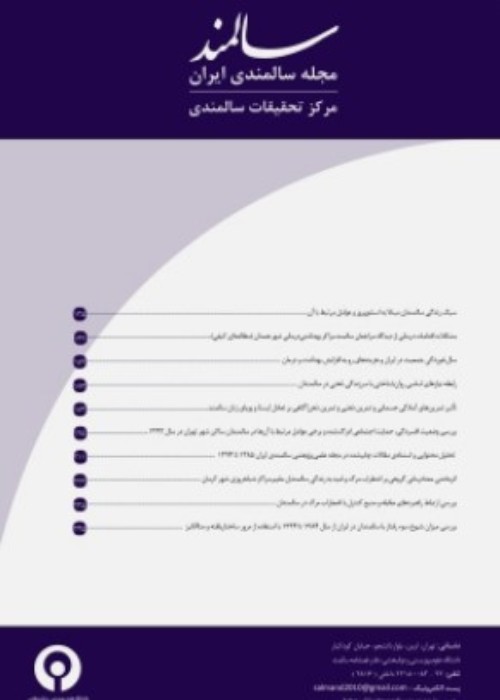Depression and Perceived Social Support in the Elderly
Author(s):
Abstract:
Objectives
The purpose of the study was to determine depression and perceived social support and some related factors among the elderly people in urban areas of Tehran in the area of Shahid Beheshti University of Medical Sciences.Methods & Materials: A cross-sectional study was conducted with 580 elderly of Tehran in Shahid Beheshti University using a multistage systematic sampling method. Data were collected by trained questioners. Standard Beck depression, Zimet perceived social support and demographic questionnaires were used. Analysis was performed by Stata software. MannWhitney test, KruskalWallis test, Spearman correlation and descriptive tests were used in this study.
Results
The mean age of participants was 69.66 ± 7.91 years. A total of 67.53% of participants lived only with their spouses; 4.01% were illiterate and 89.69% owned at least one residential home. Health insurance coverage was for 92.38% of elderly. A total of 29.6 and 46.99% of the participants expressed their satisfaction with economic and living status, respectively.The prevalences of depression in mild, moderate and severe levels were 17.41%, 25.58%, and 8.88%, respectively, and it was 51.87% in average. A total of 72.38% of participants reported their agreement with perceived social support. KruskalWallis test implied that the levels of depression had a significant relationship with perceived social support (P> 0.001). By a correlation test, a negative linear correlation was observed between depression and perceived social support (-0.388). The marital status, home ownership, health insurance, and of life and economic satisfaction showed a significant relationship with both perceived social support and depression variables. Education and depression were significantly related. But, gender and depression did not show any significant relationship. There was no significant relationship between gender and education with perceived social support.
Conclusion
Depression was found to be common in the elderly. There are similar economic and familial factors that are in relation to perceived social support and depression. According to the emotional and economic problems, creating the appropriate economic, cultural and social conditions can provide a healthier environment for the elderly to live in. Keywords:
Language:
Persian
Published:
Iranian Journal of Ageing, Volume:12 Issue: 45, 2017
Pages:
192 to 207
magiran.com/p1735033
دانلود و مطالعه متن این مقاله با یکی از روشهای زیر امکان پذیر است:
اشتراک شخصی
با عضویت و پرداخت آنلاین حق اشتراک یکساله به مبلغ 1,390,000ريال میتوانید 70 عنوان مطلب دانلود کنید!
اشتراک سازمانی
به کتابخانه دانشگاه یا محل کار خود پیشنهاد کنید تا اشتراک سازمانی این پایگاه را برای دسترسی نامحدود همه کاربران به متن مطالب تهیه نمایند!
توجه!
- حق عضویت دریافتی صرف حمایت از نشریات عضو و نگهداری، تکمیل و توسعه مگیران میشود.
- پرداخت حق اشتراک و دانلود مقالات اجازه بازنشر آن در سایر رسانههای چاپی و دیجیتال را به کاربر نمیدهد.
In order to view content subscription is required
Personal subscription
Subscribe magiran.com for 70 € euros via PayPal and download 70 articles during a year.
Organization subscription
Please contact us to subscribe your university or library for unlimited access!



